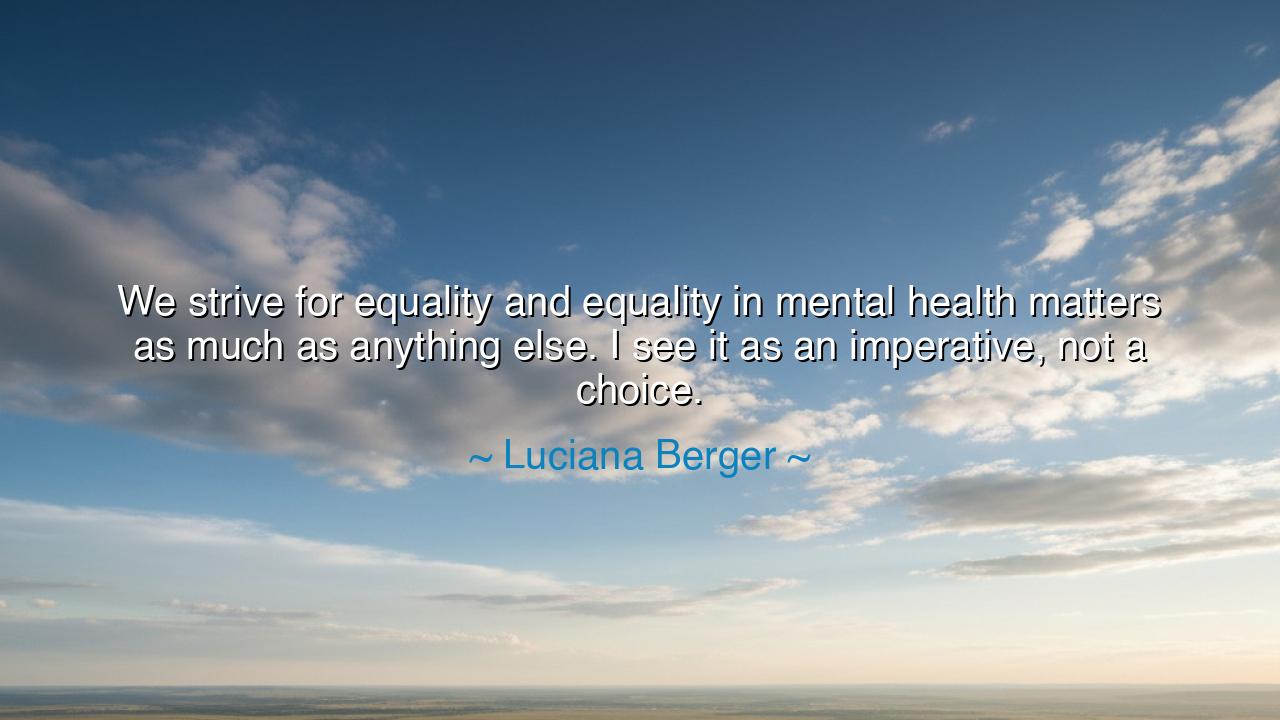
We strive for equality and equality in mental health matters as
We strive for equality and equality in mental health matters as much as anything else. I see it as an imperative, not a choice.






Hear the solemn and powerful words of Luciana Berger, who proclaimed: “We strive for equality, and equality in mental health matters as much as anything else. I see it as an imperative, not a choice.” In these words breathes the spirit of a new age — one that dares to bring into the light what generations before have cast into shadow. Her voice rises not merely as a call for fairness, but as a command of conscience, a sacred demand that the hidden wounds of the mind be treated with the same compassion as the visible injuries of the body. For what is a society if it heals the flesh but abandons the soul?
In the ancient world, the body was seen as the vessel of the divine, but the mind — the realm of thought, fear, and sorrow — was often left untended. Those who suffered within their spirit were whispered about, cast aside, or hidden from sight. Yet the ancients also knew, in their deepest wisdom, that a kingdom cannot stand when its people are broken in spirit. Luciana Berger’s words awaken this ancient truth once more: that to honor mental health is not an act of mercy but an act of justice. To care for the mind is to guard the very foundation of humanity’s strength.
The origin of her declaration lies in the modern battle for parity — the fight to treat mental well-being as essential to life itself, not as an afterthought. In our time, medicine has conquered many diseases of the body, yet the ailments of the heart and mind — depression, anxiety, trauma, and loneliness — have spread like silent storms. Equality, in Berger’s vision, means more than fairness in wealth or status; it means equality in healing, in dignity, and in the right to be seen. Her words remind us that true civilization is measured not by its monuments, but by how it tends to its most wounded souls.
Consider the tale of Florence Nightingale, who, though remembered as a nurse of the wounded, was also a healer of minds. Amid the horror of war, she saw not only the torn flesh of soldiers but the haunted despair in their eyes. She spoke gently to them, walked among them by lamplight, and in doing so, brought peace to minds as well as bodies. She understood, long before her time, that health is not whole unless both the spirit and the flesh are mended. Her legacy echoes through Berger’s words: the call to bring the same care, the same urgency, to the unseen afflictions of the human soul.
When Luciana Berger says it is an imperative, she speaks with the voice of duty — the same voice that guided reformers, prophets, and sages across the ages. To make mental health care a priority is not charity; it is the fulfillment of moral law. For as long as one person suffers in silence, the world itself is unbalanced. The equality she envisions is not a distant dream; it is a moral obligation, a sacred command to act. To ignore it is to deny the humanity that binds us all.
But her words are also a challenge to each of us. They demand that we look upon our neighbors not with judgment, but with understanding. They remind us to break the silence that surrounds mental suffering — to speak openly, to listen without fear, to extend the hand of companionship to those lost in their own minds. The ancients taught that healing begins in community, for no soul heals alone. Thus, equality in mental health must begin not only in institutions but in hearts — in the way we speak, care, and connect with one another.
Let this be the lesson carried forward: do not turn away from the invisible pain of others. See every person as both body and soul, and treat both with reverence. Demand justice for the mind as fiercely as for the body. In your home, in your work, in your speech, sow seeds of compassion. Ask not, “What is wrong with them?” but rather, “What has happened to them, and how may I help?” For to heal another’s spirit is to heal the world itself.
And so, as Luciana Berger teaches, let us make this not a movement of pity, but a covenant of equality. Let us walk forward as guardians of both mind and body, knowing that wholeness is the birthright of every human being. For when we






AAdministratorAdministrator
Welcome, honored guests. Please leave a comment, we will respond soon